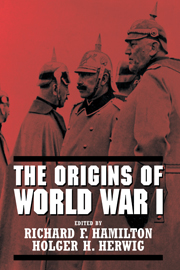Book contents
- Frontmatter
- Contents
- List of Tables and Maps
- Contributors
- Acknowledgments
- 1 World Wars: Definition and Causes
- 2 The European Wars: 1815–1914
- 3 Serbia
- 4 Austria-Hungary
- 5 Germany
- 6 Russia
- 7 France
- 8 Great Britain
- 9 Japan
- 10 The Ottoman Empire
- 11 Italy
- 12 Bulgaria, Romania, and Greece
- 13 The United States
- 14 Why Did It Happen?
- 15 On the Origins of the Catastrophe
- Appendix A Chronology, 1914
- Appendix B Dramatis Personae
- Appendix C Suggested Readings
- Index
15 - On the Origins of the Catastrophe
Published online by Cambridge University Press: 05 August 2012
- Frontmatter
- Contents
- List of Tables and Maps
- Contributors
- Acknowledgments
- 1 World Wars: Definition and Causes
- 2 The European Wars: 1815–1914
- 3 Serbia
- 4 Austria-Hungary
- 5 Germany
- 6 Russia
- 7 France
- 8 Great Britain
- 9 Japan
- 10 The Ottoman Empire
- 11 Italy
- 12 Bulgaria, Romania, and Greece
- 13 The United States
- 14 Why Did It Happen?
- 15 On the Origins of the Catastrophe
- Appendix A Chronology, 1914
- Appendix B Dramatis Personae
- Appendix C Suggested Readings
- Index
Summary
The aim of this chapter is to provide the rudiments of a theory, something intermediate between the Big Causes and Ultimate Particularism. The initial task is to provide a brief portrait of the decision-making coteries, two types of which are easily discerned: those chosen by the dynasts and those chosen by party leaders. This account also reviews the constitutional question, indicating how the key groups came to be so empowered. And it considers how those groups saw the world, indicating the rationales that led to their key policy decisions. We are dealing with patterns of small group dynamics, basically with a social psychology of leadership.
We then consider a third segment, one not present among the decision makers, namely, “the bourgeoisie,” the leaders of business and finance. As opposed to notions of a commonality of views, a sharp divergence is seen. Rather than string-pulling or behind-the-scenes operators, we have frustrated and helpless magnates (although once the decision was made, they were willing to go along, willing to “do their part”). This finding indicates the need for consideration of an important counterfactual argument: If business had been dominant, if “the bourgeoisie” had been in power, the war would not have happened. Put differently, the war happened because premodern elites, the dynasts, were still in power. The key question, then, is: How could the elites of Austria-Hungary, Russia, and Germany have made the decisions that, from the start, would clearly have such formidable consequences? How could they justify their moves?
- Type
- Chapter
- Information
- The Origins of World War I , pp. 469 - 506Publisher: Cambridge University PressPrint publication year: 2003



